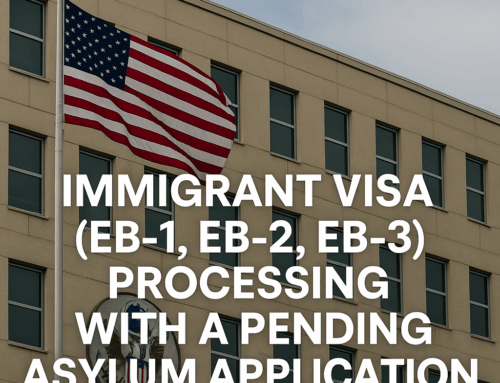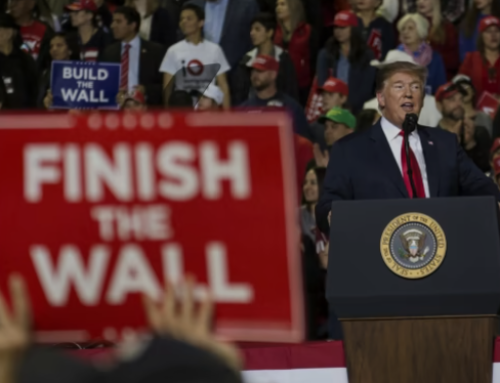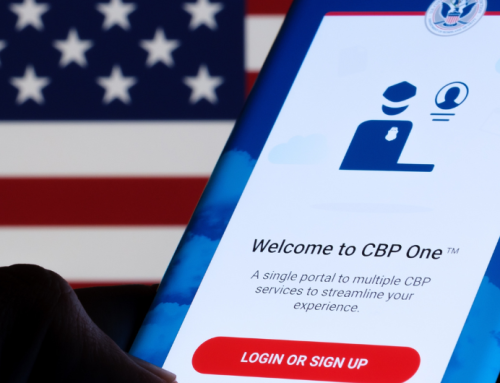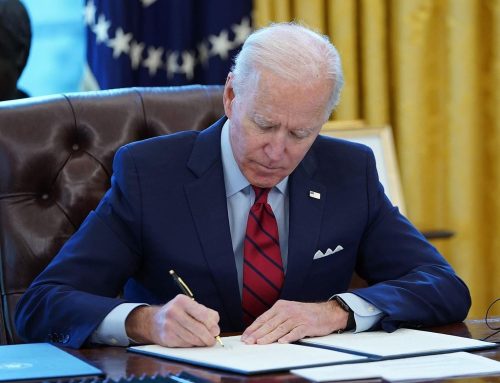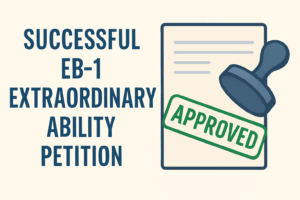 EB-1A Extraordinary Ability Petition Approved for Our Client
EB-1A Extraordinary Ability Petition Approved for Our Client
We are pleased to share that we recently secured approval of an EB-1A Extraordinary Ability immigrant visa petition for one of our clients, a leading scientist in the field of advanced computing and space research, within two weeks from submission.
This successful outcome highlights both the power of this immigration category and the importance of carefully preparing and presenting evidence that meets the EB-1A criteria.
What is the EB-1A Extraordinary Ability Green Card?
The EB-1A is an employment-based green card for individuals who can prove extraordinary ability. It applies to fields such as science, arts, education, business, or athletics. To qualify, the applicant must show that they are among the small percentage at the top of their field. They must also demonstrate sustained national or international acclaim.
Unlike many other green card categories, the EB-1A allows for self-petition. This means an applicant does not need a job offer or employer sponsorship.
How to Qualify for the EB-1A?
An applicant must either show they have received a major international award or meet at least three out of ten criteria set by U.S. Citizenship and Immigration Services (USCIS). These include:
-
Receiving lesser national or international awards
-
Publishing scholarly articles in major journals
-
Serving in a critical role for a distinguished organization
-
Making original scientific contributions of major significance
-
Serving as a judge of others’ work
-
Being featured in major media publications
-
Presenting work at major conferences or exhibitions
Our Recent EB-1A Case Success
We recently secured approval of an EB-1A Extraordinary Ability petition for a scientist working in advanced computing and space research.
For confidentiality reasons, we cannot name the client or disclose details of their exact role. However, we can share that this approval came after carefully preparing a petition that met seven of the ten USCIS criteria.
What Evidence Did We Present?
In this case, we included:
-
An internationally recognized scientific award
-
Fifty-five peer-reviewed scientific publications, many highly cited
-
Leadership roles at distinguished universities and research centers in both the U.S. and abroad
-
Original scientific contributions used by major space agencies and referenced by other researchers
-
Service as a judge on a scientific award committee and as a peer reviewer for top journals
-
Major media articles about the client’s work, including the Washington Post, Washington Times, Universe Today, Centauri Dreams, and Astronomy Now
-
Presentations at major international conferences such as COSPAR, European Space Weather Week, American Geophysical Union, and a United Nations workshop
What Are the Keys to a Successful EB-1A Petition?
Success with EB-1A depends on more than having impressive credentials. You must present a well-organized petition that tells a clear and compelling story. The evidence must connect the applicant’s work to national interest and global impact.
Letters of support should come from credible experts in the field. They must explain the applicant’s contributions in plain language. It is also important to organize exhibits clearly so that USCIS examiners can follow the narrative.
In this case, USCIS approved the petition without requesting any additional evidence. The result reflects the strength of the preparation and the clear evidence of the client’s extraordinary ability.
Considering an EB-1A Petition?
If you are an accomplished professional and want to explore the EB-1A option, we encourage you to contact our office. We have helped many extraordinary individuals secure this valuable immigration benefit.
We would be happy to evaluate your background and advise you on the best strategy for presenting your EB-1A petition.
Contact us to learn more about the EB-1A process and how we can assist you in building a winning case.


